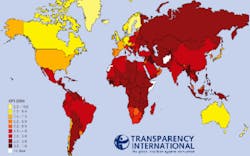Dealing with Bribery in Emerging Markets
IndustryWeek asked Ravi Venkatesan, author of Conquering the Chaos: Win in India, Win Everywhere to address the issue of bribery in emerging markets.
IW: Is there an informal understanding that when doing business in China, certain business practices are common, such as bribery?
RV: In many markets, corruption including bribery is rampant. As the map shows, this is true especially in many emerging markets including China which is ranked around 80th most corrupt by Transparency International.
But it is important to understand that bribery is a two-way street; it involves a giver not just a taker.
So companies have a choice when it comes to paying bribes. In most circumstances it is possible to operate without giving bribes but there is a cost to being ethical -- you may lose some business, approvals could take longer. If the senior management is very clear that they understand and accept this cost, a company can avoid bribing and over time it develops a reputation for honest practices and people stop asking.
IW: Are there different rules that apply to larger companies than smaller companies?
RV: The rules are the same for all companies -- it largely depends on the diligence of management which determines whether employees buckle under pressure or not. That said, it may be easier to resist if you are a large multinational with a powerful brand like Microsoft or P&G or Caterpillar. People don’t want to create a major public incident.
IW: How clear are these rules? On Monday GSK admitted to breaking the law; how would a company of their stature not now know these rules?
RV: The rules are extremely clear. The laws of the land in most countries prohibit bribery. And almost every global company has a clear Code of Business Conduct that prohibits employees from engaging in various forms of fraudulent behavior.
Well run firms like GSK go to great lengths to train employees on their Code of Conduct, they require employees to certify annually that they understand the company’s policies with regard to compliance and have strong internal processes including audits and investigations.
Yet, inspite of all this, problems occur. They occur because of greed or fear amongst one or a few employees. They either break the Code of Conduct and the policies and laws in order to meet sales targets or they succumb to greed. If there is collusion amongst employees, this type of fraudulent behavior may take time to discover.
This is why companies must pay attention to leadership and culture. The tone must be set at the very top. There must be zero tolerance in practice. The culture must be very open so that whistleblowers who sense something is amiss do come forward early and sound the alarm.
IW: How often are these laws enforced?
RV: Well obviously this varies from country to country. Very often, bribery and payment of ‘speed money’ is overlooked. But sometimes a government may get very zealous or media attention may shine the spotlight and then it becomes very serious. It would appear that China is becoming more serious about reducing corruption and crony capitalism.
IW: Why would China risk going after such a large company who has invested a lot in the country?
RV: Well if you want to make an example that is dramatic and gets everyone’s attention, it is much more effective to go after a big fish than a little fish.
IW: Is China trying to make a political statement? How will this affect foreign direct investment?
RV: Everyone seems to be focusing on what the Chinese authorities are doing and whether they are targeting a western MNC unfairly and so on. we can only speculate about their intentions.
But the real focus should be on the behavior of the management and employees of companies like GSK. That’s what went wrong. The real message here is that there is a high risk of fraud and corruption in emerging markets and companies must take this very seriously. And even when they do, from time to time, rogue employees will do something bad and how the leadership responds to the crisis will set the tone for future behavior.
I doubt that this will affect FDI. Markets like India, Brazil and China are very large and companies can scarcely choose to opt out because of an incident like this -- unless it turns out over time to be systematic persecution.

